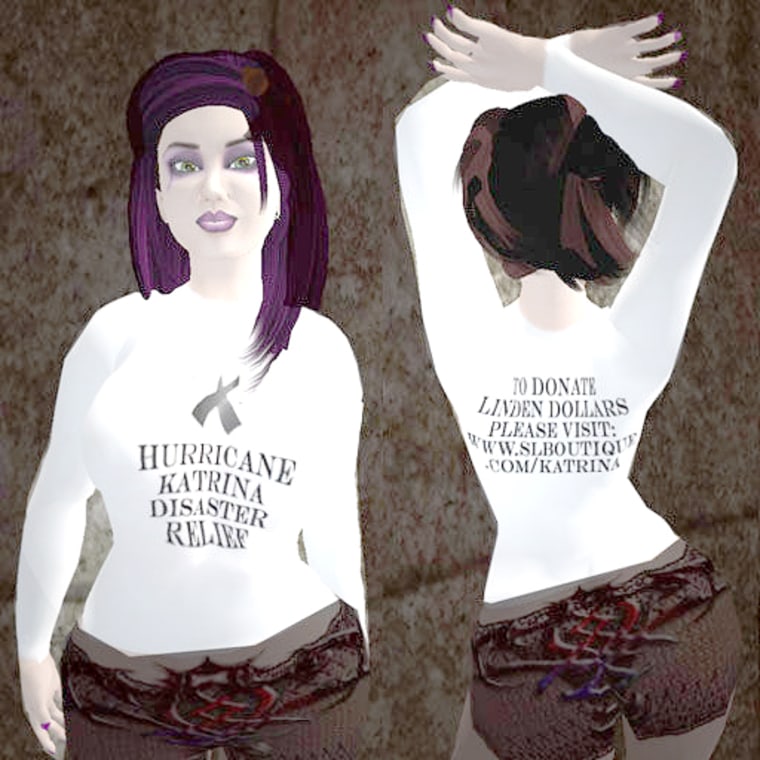Meet the 21st century's answer to the Jerry Lewis Telethon.
Inside the free form virtual world "Second Life," a desire to help Katrina victims has spawned yard sales, auctions and fund-raising concerts. Proud donors wear T-shirts that read "Hurricane Katrina Disaster Relief."
Everything in "Second Life" is virtual: The yard sales are stocked with virtual clothing and goods; the relief concerts and dances star virtual DJs and bands performing in a virtual concert space. And those T-shirts ... also virtual.
The money raised, however, is very real.
"Second Life" residents, as users of the space are known, have contributed almost $6,000 to the Red Cross so far, with one celebrity date auction netting $2500. (The dates, of course, are virtual.)
Then there's the people melting virtual gold.
Questing for charity
Over at "Ultima Online," a massive multiplayer online role-playing game, or MMORPG, Joe Harden says he has committed $200 to the Red Cross with another $200 awaiting conversion from gold to U.S. dollars.
Gold? Dollars?
MMORPGs like "Ultima Online" are infamous for the time users spend online in their never-ending quest to improve, or level up, their character. Success in questing or other challenges
yields gold, "Ultima Online's" virtual monetary system, or other goods.
Over the past decade such items have gained a real world value, particularly among players not content to gain status the old fashioned way, with a gray market for virtual money and goods appearing on eBay and a handful of virtual world-specific auction sites.
Harden first tapped into that market after the Asian tsunami. Selling his own gold and gold donated by other "Ultima Online" players on eBay, he raised $8,000 in five months.
"Although players become absorbed in the virtual world," Harden e-mailed MSNBC.com, "this proves how concerned they are about the real world around them."
Harden's Web site, , is now collecting for Katrina relief and word of the project is being spread by game players soliciting gold within "Ultima Online."
"People I have never met or talked to contact me at all times of the day to ask where they may donate virtual goods," said Harden.
Users of another MMORPG, "EverQuest II," are also being asked to donate. Sony Online Entertainment announced last week that players who type "/donate" while playing the game will be taken to an American Red Cross Hurricane 2005 relief page where they can donate money. Sony has also suspended billing for the 13,000 "Everquest II" subscribers living in the affected areas.
A virtual community takes action
For charitable activity, no virtual world matches that of "Second Life," which since its June 2003 launch has seen fundraisers for tsunami victims, the American Cancer Society and even a veterans organization, the drive for which was led by a "Second Life" resident who had served with the Special Forces in Afghanistan and Iraq.
"Many in the community are predisposed to this type of thing not only because it's doing good, but because they are excited about the potential of 'Second Life,'" said Wagner James Au, the world's official embedded reporter who chronicles various "Second Life" happenings in his blog New World Notes.
"Second Life" is not an MMORPG, but an open-ended virtual world where residents are free to make of it what they will courtesy of in-house development tools and programming scripts. Since its June 2003 launch, the community has grown to accommodate over 25,000 residents, who retain intellectual property protection for the digital content they create.
It was within this framework that one resident built a memorial to Katrina's victims on Sept. 1. Other residents pitched in, seeding the virtual world with donation points that used "Second Life's" built-in commerce functionality. With a click of a button, residents can transfer Linden Bucks, the virtual world's currency, directly to an account created for fundraising.
This virtual money is then converted to real money using "Second Life's" own currency exchange program called Gaming Open Market, which residents use to buy or sell Linden Bucks. Currently 1000 Linden Bucks, or L$1000, sell for $3.40.
Since the Katrina memorial was built, "Second Life" has also played host to a number of fundraising activities including yard sales, dance parties and even a dating auction where 100 residents bid on dates with various "Second Life" personalities.
"Auctioning items is not that much fun," auction creator Kristan Hall, who goes by the moniker Katt Kongo, said by way of explaining why she decided to try selling dates.
Hall secured promises from Linden Lab employees, who maintain a deity-like status within "Second Life," to put dates with their avatars on the block. (The only caveat was no sex, even of the virtual kind.) The two-hour auction generated more than $3,000 when converted to dollars.
When combined with the other events, "Second Life" residents have raised over $6,000 in just two weeks.
In a strange twist of fate, however, such efforts risk being too much of a success. According to Au, a virtual fundraising walk for the American Cancer Society resulted in a 4 percent drop in the exchange rate when the virtual funds raised were sold on Gaming Open Market for dollars.
